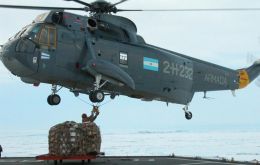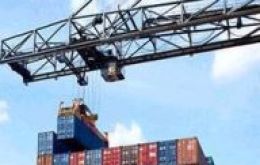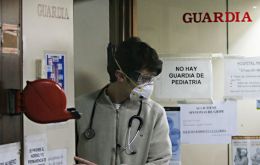MercoPress. South Atlantic News Agency
Argentina
-
Monday, July 6th 2009 - 10:07 UTC
Two Sea Kings for Argentine Antarctic operations

The Argentine Navy received at the end of June the second batch of two UH-3H Sea King helicopters out of a total of six which will replace losses experienced in Antarctic operations it was reported by Puerto Belgrano Marine’s Gazette.
-
Sunday, July 5th 2009 - 11:53 UTC
Argentina confirms 55 deaths from the A/H1N1 virus flu

Argentina’s minister of Health Juan Manzur confirmed on Saturday that the number of deaths from the A/H1N1 virus influenza had reached 55, although non government organizations insist the number is higher.
-
Saturday, July 4th 2009 - 14:09 UTC
Argentine dissident Peronists want control of the party

Dissident members of the Argentine ruling Justicialista (Peronist) Party have asked for the removal of the party’s interim president and the naming of new authorities, following the debacle of last Sunday’s mid term election for President Cristina Fernandez de Kirchner and husband Nestor Kirchner.
-
Saturday, July 4th 2009 - 09:17 UTC
Brazil threatens to take Argentina to WTO on import licences

Brazil may file a complaint at the World Trade Organization against Argentina because of its delays in issuing import licenses for Brazilian goods according to Foreign Trade Chamber Secretary Lyntha Spindola.
-
Friday, July 3rd 2009 - 13:52 UTC
Argentina reports 44 deaths; highest A/H1N1 virus flu mortality rate

Argentine health officials reported 17 more H1N1 flu deaths, bringing the total to at least 44 in the country hardest hit by the A/H1N1 virus in the southern hemisphere. Health Minister Juan Manzur said that “between 43 and 44 deaths” linked to the virus had been confirmed, a significant jump from the 26 that had been reported by the ministry on Friday.
-
Wednesday, July 1st 2009 - 13:00 UTC
Argentina: health emergency and school vacations extended to fight the flu

Authorities in Buenos Aires City and Buenos Aires province declared health emergencies on Tuesday and extended school vacations as the country’s death toll of A/H1N1 virus influenza surged to 35.
-
Wednesday, July 1st 2009 - 12:56 UTC
“Kirchnerism is finished” but “not the Peronist party”

“Kirchnerism is finished” said the governor from the Patagonian province of Chubut and presidential hopeful, Mario Das Neves following a meeting on Tuesday with Buenos Aires Governor Daniel Scioli to discuss the next steps of the Peronist Party.
-
Tuesday, June 30th 2009 - 15:13 UTC
Mrs. Kirchner downplays defeat and asks for support from Congress

Argentine president Cristina Kirchner downplayed the defeat suffered by government candidates in Sunday’s mid term elections and insisted the ruling coalition had won with 31.03% of the overall national vote, denied any cabinet changes and criticized political analysts for their interpretation of election results.
-
Tuesday, June 30th 2009 - 14:56 UTC
Kirchner quits the presidency of the Peronist party

Argentine former President Néstor Kirchner announced Monday he had resigned the presidency of the Justicialista (Peronist) Party, in a message that was recorded in the Olivos presidential residency by the official news agency Telam and was aired by the local media.
-
Monday, June 29th 2009 - 15:11 UTC
Argentina ready to impose flu pandemic “sanitary emergency”

Health authorities confirmed that this week Argentina will be declaring a “sanitary emergency” in the whole country given the advance of the A/H1N1 virus influenza that so far has killed 27 people and infected at least 1.800. Another victim of the pandemic is forecasted to be Public Health minister Graciela Ocaña.
